3 Things that Data-Driven Marketers are Doing Wrong
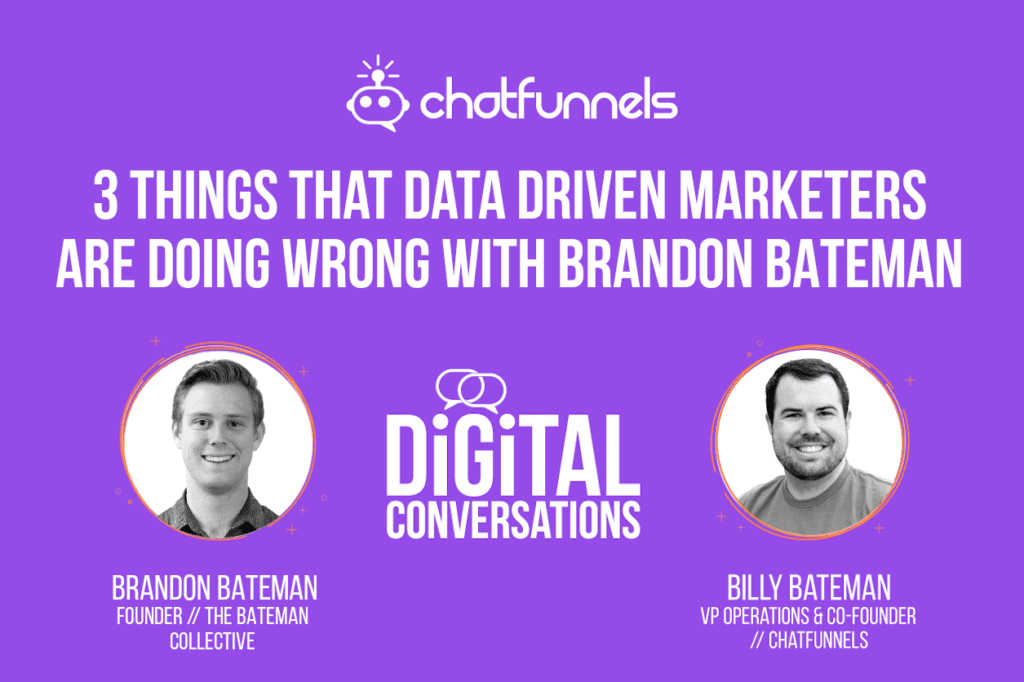
Reading Time: 14 minutes
Overview: This week on Digital Conversations we feature Brandon Bateman founder of Bateman Collective. He goes through three things that data-driven marketers are doing wrong and how you can correct them.
Guest: Brandon Bateman- I founded Bateman Collective Digital Marketing. Bateman Collective is a team of creatives, data scientists, and big-picture strategists with one common belief: together, we can achieve extraordinary results. We believe in empowering our clients by leveraging a data-driven, creative paid traffic strategy.
Listening Platforms:
Billy: Alright everybody, welcome to the show today, today my guest is Brandon Bateman, founder of the Bateman collective, Brandon thanks for joining me today.
Brandon: Yeah, thanks for having me today Billy.
Billy: Yes, so before we get into it, just tell us a little bit about yourself and the Bateman collective?
Brandon: Yeah, absolutely, so yeah as you said my name is Brendan Bateman, my company is Bateman collective and a lot of you are probably wondering that I’m talking here with Billy Bateman and there is no relation, although we’ve kind of we’ve gone through all the checklist trying to figure out if are sharing kind of family members or anything, but just a coincidence, but anyways, yeah that’s kind of as an interesting conversation, when we first met and I guess we have a company named after you locally here.
So, anyways, the Bateman collective is a company that started about two and a half years ago and we’re kind of a boutique agency for paid search and paid social, that’s what we specialize in, that’s all we do and we’re very much on the data-driven side, so we don’t do any creative really and we’re just focused on driving data driven insights for our clients and optimizing their campaigns.
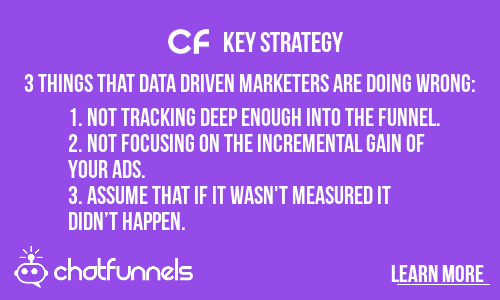
Billy: Awesome, and so how’d you get into that?
Brandon: Well, I have been in marketing for quite some time, considering my age, so it’s worth saying that I’m a young guy, I am actually just finishing up college right now, but this is a company that I started when I was in sophomore college, I don’t even know if you know that right now, because a lot of people don’t know that about me.
Billy: No, I don’t know you’re still in school, no.
Brandon: And a lot of people don’t, honestly I feel like I’m not, considering recent events and everything has changed a lot and even for the past year, I’ve been; you know it’s almost like I’m doing school part-time and I’m doing my business full-time and I felt a small team and really grown to you know work with a lot of clients that I really enjoy working with.
So, yeah, it’s kind of a side thing that I’m just finishing, because I started; but anyways, yeah, I started with digital marketing, when I was 16 years old actually or 15 years old, my first job ever was that a digital marketing agency, so that’s where I kind of learned their loops a little bit, I got some the interest in it and I just really you know, I’ve always liked math, statistics, data science and I’ve just kind of built on that and taking it to marketing and especially in the past couple years since starting the company, I feel like I’ve been very fortunate to find a lot of opportunity for growth in methodology and in when things are done, in terms of digital marketing.
So, yeah, that’s kind of the history behind that…
Billy: Awesome.
Brandon: And yeah.
Billy: Well yeah, dude that’s great, so before we get into the middle of our topic today, I’ve got one more question for you, so if I’m going to look you up on social or anybody who try to figure out who Brandon is, what’s something that I wouldn’t figure out about you?
Brandon: Well the answer that question is probably just about everything considering as much as I do social media marketing, I’m not very active on social, but the one thing that a lot of people don’t know about me is I love what’s called split boarding, it’s basically snowboarding in the back country, where you get a snowboard and you split it in two, you split it in half into two skis and you walk up a mountain and then, you ride back down and yeah; I just really love that, as you know, I’m sure you has the girth and everything’s right, but yeah, most people don’t know that about me.
Billy: Cool man, well, let’s get into the topic today, so when we started, when I first met you and we started talking about what you do, is you get a chance to look at a lot of different companies and how they’re spending their money to drive traffic and you told me hey, there’s a couple things that I’m seeing consistently across the board that most marketers are doing wrong, even though they’re trying to be driven by it, by data.
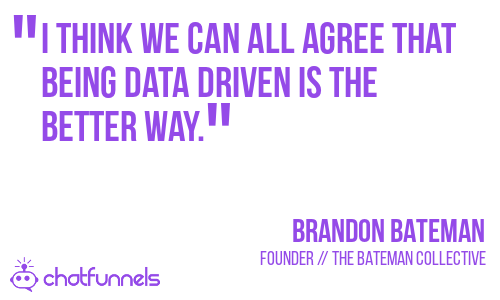
So, I’ll just ask you like let’s see, let’s get into it. What are you seeing are those big trends that people aren’t doing well?
Brandon: Yeah, absolutely and in the past. I think twelve months, I’ve added about thirty five million dollars in paid search and paid social advertising stuff. I’ve been fortunate to see in a lot of different accounts. I think we all can agree that to be data-driven is the better way. I think at this point people agree with that, but there are a lot of gaps right. Between truly being data-driven and where most of us are right now.
So, yeah this isn’t intended to be a rules on marketing or anything like that. There’s where we all make our own mistakes. But I do think that there is some low-income. Ads in terms of you know what we could be doing better. One thing that that I’ve seen kind of consistently. This is more of a problem with B2B than it is with e-commerce for example.
Although, it can be a problem with B2C if you’re doing lead generation. But most people just aren’t tracking deep enough into the funnel right. Most digital marketers kind of leave digital marketing conversion tracking. To what is left on digital and they don’t take into account offline conversions. That’s kind of like you know, we’d call someone really silly for optimizing on impressions. When they really care about clicks or for optimizing non clicks when they really care about conversions.
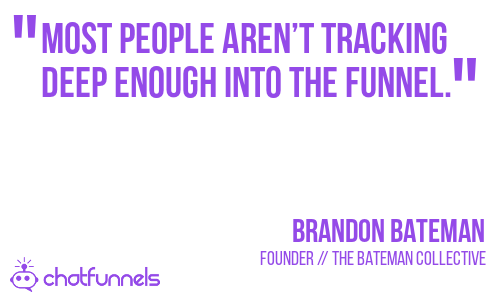
But we don’t really focus on this level too much and I think that we need to think about. The real purpose of conversion tracking to understand why this is important. Because a lot of people look at conversion tracking. They think the whole purpose of this is for me to know. How much money I made for my marketing. That’s useful and especially that’s a little bit more prominent in many business owners right. They just want to know it; does Google Ads work right. Are we making money off of Google Ads.
But beyond that, conversion tracking is super important. Because it doesn’t just tell us if it worked overall on a macro scale. But it tells us what worked and if we’re not tracking, we can’t optimize. So, that’s why I think it’s super important to track as deep into the funnel as we possibly can.
Billy: Okay, so when you’re, when you’re saying like let’s go deep into the funnel, you’re saying like really let’s go beyond like hey, we drove them to the website and they filled out a form, let’s really look at the entire funnel, like did they end up if you’ve got a brick-and-mortar presence, did they end up coming in there how can we track that or maybe it’s an event or something like that, I just want to be clear like what you’re, what you’re getting at here?
Brandon: Absolutely yeah, we want to tie as best as we can our true business goals to what’s happening in our digital marketing right, so I think that that one really simple example; of course, the reason we don’t do this a lot is, because it can get very complex…
Billy: Yeah, yeah.
Brandon: Because it’s, I mean…
Billy: Not easy.
Brandon: We, yeah, we can’t pretend that attribution is easy and really when it comes down to it sometimes, you just kind of have to get together with your company and decide how you want to be wrong about something, because you’re not going to be perfectly right and there are a lot of nuances, but that doesn’t mean that it’s not what do mean right.
So, one of the, one of the biggest areas of low Ads here’s with Google Ads. Google Ads makes it so easy to track offline conversions. Basically. what you can do, let’s just say you’re a b2b company. You have forms that you’re trying to get people to fill out on your website. All you need to do is add an extra Field called GTLID onto the form. Get that to dynamically populate based on the URL parameter or for example. If you’re in a chatbot, you can you can pull any URL parameter as a form field. Have a view that GTLID; stands for Google click ID.
And this is essentially a unique ID that it’s assigned to each click that happens on Google. So if we can capture that data pull it into our CRM and then push it back into Google Ads. The most simple way probably is to use the Google sheet. Where you just have the GTLID and then you have the conversion action in two different columns. Then you have that automatically upload to Google Ads. You can dynamically populate the sheet with Zapier. Or you know some other type of integration with your CRM. Or even if you just want to go in and export things and import them into Google once a month. For example, that could be a you know in between way of doing it, perhaps not as automated.
But if you can report back what that person ended up doing along with their Google click ID, then you can pull that data into Google ads and you can see what drove the final outcome.
Billy: Okay, yeah.
Brandon: You’ll necessarily just withdraw the lead.
Billy: Alright, that makes sense, okay, so, first one, not going deep enough into the funnel, so would you just, what would you say is the next, the next thing you’re seeing?
Brandon: I think that another area where marketers are falling short a lot of time is just not focusing on incrementality.
Billy: Okay
Brandon: I think that everybody understands this on a conceptual level, at least the idea that you know when we track conversions, we really care about what’s the incremental gain of what it is that we are trying to do here, but oftentimes we’re just not the best at tracking that, right, because typical tracking when it comes to digital marketing is view-through conversions, click-through conversions and you know like a standard for Facebook for example, it would be a 28 days click, one day view and you know if they saw the ad within one day of converting or if they clicked the ad within 28 days of converting, then we count that.
But there there’s just a much better more data-driven way to do it and a lot of people, it’s just a super underutilized feature in Facebook ads, are called holdout tests and essentially what they are is an incrementality test for Facebook ads, where it allows you to take a percentage of the population, let’s just say it’s 10%, 20% and you; well it’s actually a percentage of your audience that your ad would see right?
Billy: Yeah.
Brandon: You have a 2 million people in your audience, you can sell 200,000 of them and just say we’re not going to show ads those people and then, you shall add so the rest of the people and what you measure is a conversion lift right and this can be used at any stage of the funnel and can give so much better of detail regarding, you know what exactly are we driving incrementally that we weren’t driving previously.
Billy: Okay, so what, do you what are you typically finding was the holdout test?
Brandon: Well, one of the areas where I think a holdout test is best to use is in the bottom of the funnel.
Billy: Okay.
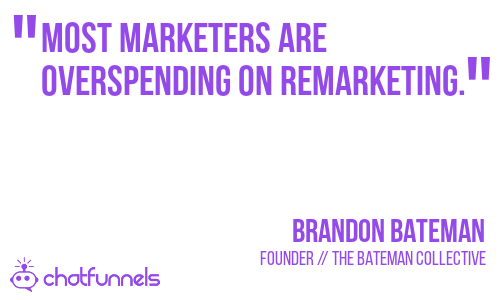
Brandon: I think that universally, we love the bottom of the funnel as digital marketers, because we get great results in the bottom of the funnel, so our retargeting campaigns don’t tend to work very well from a numbers standpoint, but I find that through holdout tests, most marketers are overspending on a remarketing and what that really comes down to is, we look at the cost per conversion in remarketing based on you know standard tracking and it might look and they might look excellent compared to the top of the funnel, but what we forget sometimes is; it’s not supposed to be anywhere near the top of the funnel, it’s supposed to be in a completely different league, because a lot of these people were going to convert anyways right.
So, sometimes we scale those remarketing campaigns a little bit more aggressively than we should and incrementally, they’re not actually adding that much value, so that’s where I think that that a holdout test can add a lot of value.
Billy: Okay, sounds good, makes sense, okay and then the last thing that you mentioned to me was assuming that if it wasn’t measured, it didn’t happen, so can and you didn’t expand on that at all, so what are you, what do you see in there, like what’s your take away?
Brandon: Yeah, so this is again kind of a mindset issue, I guess you could say that that I think that a lot of us as digital marketers have and it’s the idea that you know we can measure so many things and it’s this idea that data is just pain all the time and I mean you know me Billy and you know that that I guess, I very much subscribe so the idea that I’m going to be data-driven, we need to follow the data, but the problem with that is not everything can be measured right, so talked about a couple of things where maybe we can measure the results of our campaigns a little bit better, so we’re not over reporting or we’re not under reporting.
But as a general mindset shift, I think that we need to recognize; sometimes beyond the measurement, there are things that we are just missing out on, when it comes to digital marketing. I’d love to share an example, there was a there was a company that I was working with. This was Q4 and they’re an e-commerce company. We were just trying to push as many sales as we could by Christmas. And we were, I don’t know how much I could share in terms of the actual numbers.
But basically we’re killing it in terms of the results. We decided to try something peculiar and a lot of people would kind of laugh at this on Facebook. But we decided on some of our campaigns to go from a purchase objective. To an had acquired objective and see what could happen. Because we were just hitting. We were Ads scale but by the evening $35,000, paying, spend and it was. At that level of spend on Facebook only in the United States. We were starting here walls, we were trying to figure out how we can scale this more.
Billy: Yeah.
Brandon: And we, yes, I went to Add to Cart and instantly, you know within hours and then of course, it’s within days, we all the data came in, we just saw that things plummeted right, because we weren’t optimizing for the end goal, we saw their cost per conversion just about doubled and it was just bad and the unique thing about this situation though, was this was a fairly new company and the only things that they’re doing from marketing at this point were Facebook Ads and affiliate marketing right.
They had a couple affiliates and those are pretty easy to track, because they had affiliate codes. We knew their websites and everything. So we were pretty confident about the impact of the affiliates and then this. And then we had this big Facebook Ads piece. But we noticed this gigantic halo effect. So as soon as we went to the Add to Cart purchase. Or to the Add to Cart optimization, we looked and we noticed. Well as we’re scaling and we’re using this type of optimization. Our overall sales from our company are scaling. They didn’t take the hit like we’re seeing in the Facebook account.
That kind of brought up some confusion and we ran it for a little bit and eventually we pulled all the data we have from all of our channels and we built a regression model based on it and tried to understand, you know what’s actually driving revenue here and our model estimated that for every one sale we had, attributed to Facebook, we had one point four sales that were not attributed to Facebook, which as you can imagine is a gigantic difference, I mean that’s 40 percent measurement error in a situation and that optimization was actually working better for us than the previous optimization had.
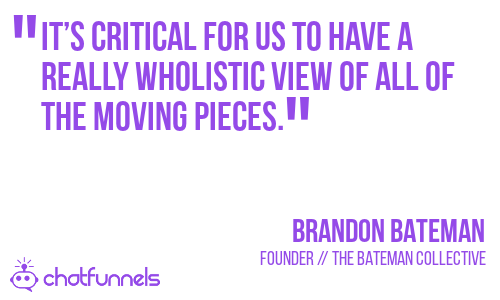
If we had tunnel vision and we’re just looking in this account and we’re just trying to figure out what’s going on there, then we are potentially missing something, we’re potentially missing a breakthrough that it’s going to help us get the next level of scale and that’s where I think it’s just critical for us to have a really holistic view of all the moving pieces here, so that we don’t make decisions just based on the data, right; and at the end of the day that decision that we made was based on data right, but we had to collect her own unique data and we had to look at it holistically and we had to move past just what was right in front of our face and try to understand exactly what was happening.
Billy: Oh I think this is totally key, we have the same thing with our customers, where we’ll optimize to you know hey, whether they want to use the BOTs to capture emails or set meetings and you know, it’s easy to get the tunnel vision on like okay, you know 100 conversations, 30 meetings set, like great job, but you got to look further down the funnel and see like okay, did they actually show up for that meeting, did they actually turn into a sales opportunity and did they end up buying anything.
An example similar to what you’re sharing is, we had a month with one of our clients where like. We crushed a doubled our previous month in total meeting set. We were already doing well and then. When we started looking further down the funnel. None of these were turning into end sales opportunities or converting. We weren’t really sure why, took stepping back. Talking to their marketing team, talking to their sales team. Tealizing a promotion had been run with an affiliate without the affiliates audience. While they were really responsive. We didn’t fit the buyers profile at all.
So, like hey, they loved the offer, but couldn’t afford the offer. It you wouldn’t have found that just looking at the numbers. Looking at the numbers, we thought we crushed it. You’ve got to step back and realize there are things that aren’t measured that that do happen.
Brandon: Absolutely, I don’t have to present agreed and I think that that kind of summarizes, my take away from these audits I’ve done is, I think I think that we need a mindset shift around being data-driven, because at the end of the day there’s a gigantic difference between being driven by data and being blinded by data and far too often as marketers we are blinded by data, meaning we don’t really recognize it for what it is and what we really care about is the truth, I think that we can all agree on that?
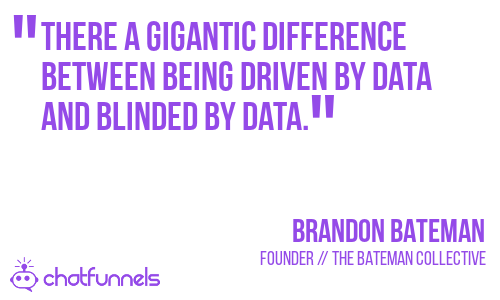
Billy: Yep.
Brandon: We want to know the truth of what is happening and the problem happens when we view the data as the truth right, I think that that is the purpose of being data-driven, data is the truth and we legislate follow that, but the reality is in a simplified model that goes on top of an underlying much more complex truth and it kind of gives us a window to it, but it’s not always a perfect window and it’s skewed in a lot of ways and we have to learn to continually manage those different errors that we are getting with the data, so it’s ultimately approach the truth, but not necessarily be blinded by the data that’s read in front of our face.
Billy: Yeah, I love it Brandon, I love it, there are the gaps that we you still need people, like if it was just the data, we could have machines doing this, we’ve got to have the people to look at the data, take a step back and no window, look big picture and when to drill in. I love it man, thank you so much.
So, if people want to continue the conversation with you, how should they reach out?
Brandon: Yeah, thank you, Thank You Billy, the best way to reach out to me is probably just through my email address and that’s Brandon that’s B-R-A-N-D-O-N Brandon@Batemancollective.com and that’s B-A-T-E-M-A-N collective. So, yeah, I love to chat with anybody and a lot of what we’ve talked about here is analyzing data, trying to figure out what’s going on and we love that and just so you know Billy, I love doing audits for prospective clients or anybody who reaches out to me and that is literally the fav, my favorite everything of all the things I do right, like I save that for the weekend, you know how, that’s like my relaxing time, unwind the audience and digital marketing accounts.
So, yeah that’s, if anybody’s interested in having a second set of eyes take a look at their data and what might be happening there and how they can drive incremental results in their business, that’s absolutely the involvement that I want.
Billy: Okay man, I am glad to hear there’s someone else that, that has the sickness like me and will work on the weekend just for fun. So, okay well thanks for coming on again and we will chat later Brandon.
Brandon: All right, thanks Billy.
